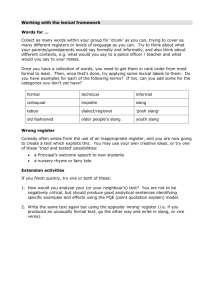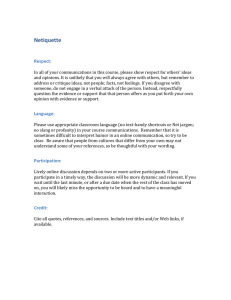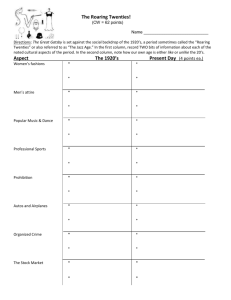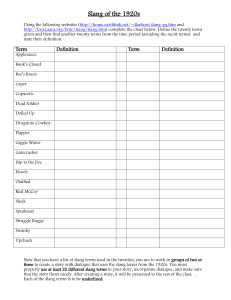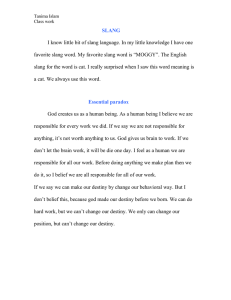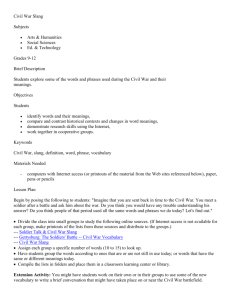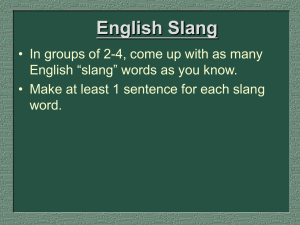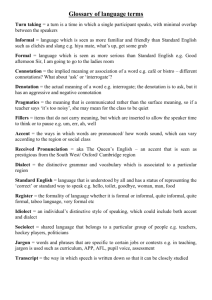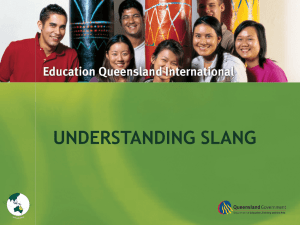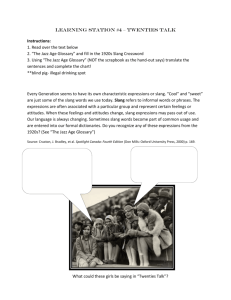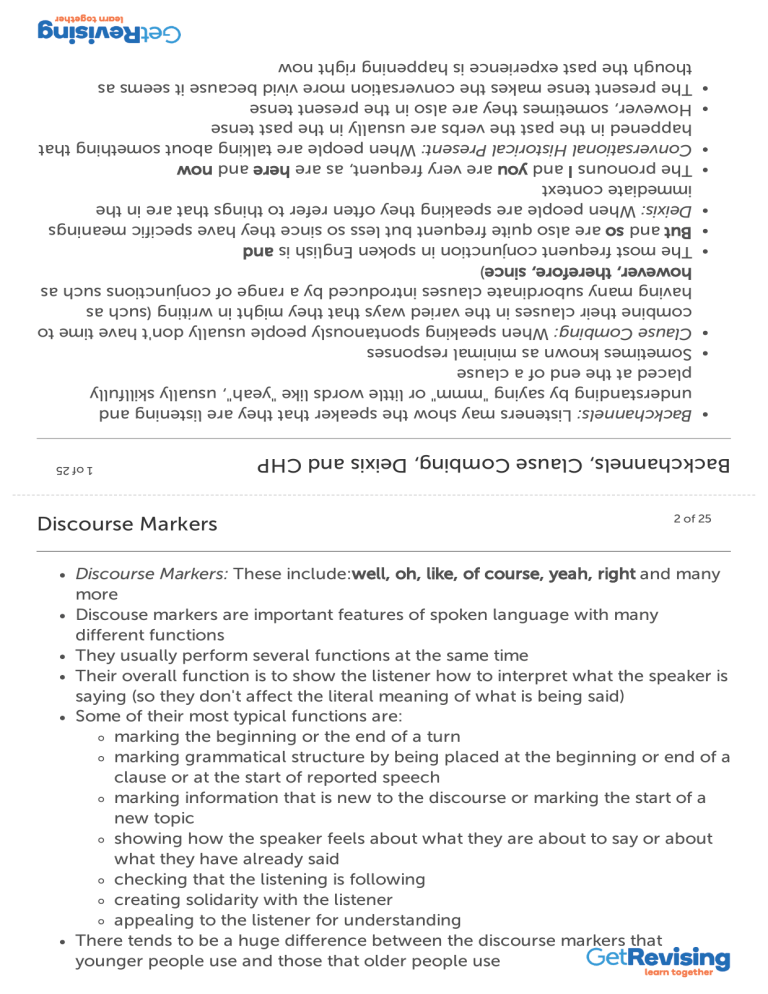
Discourse Markers: These include:well, oh, like, of course, yeah, right and many more Discouse markers are important features of spoken language with many different functions They usually perform several functions at the same time Their overall function is to show the listener how to interpret what the speaker is saying (so they don't affect the literal meaning of what is being said) Some of their most typical functions are: marking the beginning or the end of a turn marking grammatical structure by being placed at the beginning or end of a clause or at the start of reported speech marking information that is new to the discourse or marking the start of a new topic showing how the speaker feels about what they are about to say or about what they have already said checking that the listening is following creating solidarity with the listener appealing to the listener for understanding There tends to be a huge difference between the discourse markers that younger people use and those that older people use 2 of 25 Backchannels, Clause Combing, Deixis and CHP Discourse Markers 1 of 25 Backchannels: Listeners may show the speaker that they are listening and understanding by saying "mmm" or little words like "yeah", usually skillfully placed at the end of a clause Sometimes known as minimal responses Clause Combing: When speaking spontanously people usually don't have time to combine their clauses in the varied ways that they might in writing (such as having many subordinate clauses introduced by a range of conjunctions such as however, therefore, since) The most frequent conjunction in spoken English is and But and so are also quite frequent but less so since they have specific meanings Deixis: When people are speaking they often refer to things that are in the immediate context The pronouns I and you are very frequent, as are here and now Conversational Historical Present: When people are talking about something that happened in the past the verbs are usually in the past tense However, sometimes they are also in the present tense The present tense makes the conversation more vivid because it seems as though the past experience is happening right now General Extenders: These are phrases like and stuff, and things, or something or and all that They are called this becuase they often indicate that the previous word is part of a set, so they extend the meaning of that word without having to specify all the members of that set Some people use these words to be purposely vague, to signal that they are not quite sure about something However their most important function seems to be to create solidarity between speakers By using a general extender the person speaking suggests that their interlocutor shares their knowledge or opinion, so there is no need to be explicit Hedges: These are words that downtone the meaning of the following word E.g. that's a bit odd Or add a note of intentional vagueness to what someone is saying Intensifiers: These are words like very or really that occur before an adjective or an adverb to boost the strength of its meaning E.g. really fast, very delicious, well good Young people often choose intensifiers that are different to those used by older generations Therfore intensifiers tend to fall in and out of fashion in spoken language General Extenders, Hedges and Intensifiers 3 of 25 Monophthong and Narrative Structure 4 of 25 Monophthong: This is a vowel sound that is "pure" in that the beginning and the end of the vowel are more or less the same In Multicultural London English some vowels that for older Londoners are diphthongs, such as the vowel in words that rhyme with GOAT are now monophthongs Narrative Structure: People often tell stories in the past tense, and when they do the stories often have structure to them They may begin with an abstract, where the speaker says what the story will be about This is usually followed by an orientation section where people mention relevant aspects of the story such as: who was involved, where they were and when the events happened The main events of the story are given in the complicating action: a series of short clauses, in the order in which the events happened There may then be a resolution, where the speaker tells listeners what happens in the end, and a coda which rounds off the story Stories do not always have all of these sections but the complicating actions and orientation section are usually present Throughout their narrative, people use different ways of making it interesting for their listeners so that they realise the point of the story These are very variable, even in standard English E.g. the past participle of LEARN can be learned or learnt or the last tense of RING can be rang or rung Some of the most frequent nonstandard forms are the past tense of DO (I done it) and COME (I come here yesterday) neither of these are actually grammatically correct Past tense forms of BE are also very variable In standard English the past tense forms are: I was, you were, he/she/it was, we were and they were Except for you they mark a distinction between singular subjects and plural subjects In most nonstandard varieties the tendency is to use just one form - either were where standard English has was or the other way round - though speakers may vary between using the standard and nonstandard forms In most urban nonstandard varieties in the UK there is a tendency to use weren't in negative contexts and was in positive contexts, though this is changing in areas influenced by other varieties such as AfroCaribbean English or post colonial varieties of English Non-standard Grammar 5 of 25 Non-Fluency Features 6 of 25 These include: Silent pauses Filled pauses (er and erm, spelt uh and um in American English) Repetition False starts (like crossing out in writing) They may have functions in spoken language, including dramatic effect, highlighting what is coming next, and showing that the speaker is planning what they are going to say next but don't want to give up their turn at speaking Individual speakers vary in the frequency with which they use these features Er and erm tend to occur either at the beginning of a clause or before a new topic is introduced They also occur when speakers are searching for a word Unfilled (silent) pauses are often used in the same way Repetition of a single word is often at the start of a clause or a noun phrase, showing that the speaker has mapped out the rough grammatical outline of what they want to say but has not yet produced the detail In these cases the repetition is usually of a function word Sometimes they repeat a word but add something extra, this is usually a content word Content words = main info; Function words = relate parts of clause together Speakers seem to like to use three part lists Sometimes they utter three consecutive clauses with the same grammatical structure but slightly different lexical content This strategy is much loved by politicians, as listners often spontaneously applaud after the third clause or item on the list Other strategies allow speakers to emphasise different parts of their discourse E.g. they may put part of an utterance in an unusual position 8 of 25 Quotative Expressions Rhetorical Strategies 7 of 25 People often report what they or other people say Direct reported speech is more lively and interesting than indirect reported speech becuase by appearing to quote someone the speaker almost acts out what they are reporting When they introduce direct reported speech older speakers of English usually use SAY or GO to introduce the quote, or there may be no introduction at all (this is known as a zero quotative) if it is clear whose speech is being reported Younger speakers have an additional quotative expression: BE LIKE - and in London there is an even newer quotative expression: THIS IS + speaker Other quotative expressions are also heard E.g. SAY: They said "move away" BE: They went "move away" ZERO: "Move away" BE LIKE: They were like "move away" TELL: They told him "move away" THIS IS + speaker: This is them "move away" (perhaps only in London) HERE'S + speaker: Here's then "move away" (perhaps more frequent in Ireland) Sometimes slang is used in a way that can be cruel or unkind E.g. calling someone a jerk Most slang is limited to certain areas But some words such as "okay" are used worldwide, on the radio, television and in newspapers Slang is popular becuase it is catchy and timely most slang has a very short life It meets a momentary need or expresses a temporary opinion Yet some words that are now considered standard English started out as slang These include words such as: Taxi Flapjack Hoax Bogus Skyscraper Fan 10 of 25 Slang Slang #2 9 of 25 Defined by the Oxford Dictionary, slang is: "a type of language consisting of words and phrases that are regarded as very informal, are more common in speech than in writing, and are typically restricted to a particular context or group of people" E.g. In army slang "grass" is slang for marijuana It is also defined as: Words and expressions that are informal and are not standard English Different social groups often use a special vocabulary Sometimes this is fairly widespread and well understood Some slang is confined to small tightly knit groups who can use it to exclude outsiders Slang is often sexual or scatological Slang expressions may act as euphemisms and may be used as a means of identifying with one's peers They may be new words or old ones used with a different meaning The desire to say old things in a new way leads to slang When something becomes very common in our daily life we are likely to mak eup new words for it Slang is part of every profession, trade, sport, school and social group Slang often involved the creation of new meanings for existing words It is common for the new meaning to be significantly different to the previous meaning E.g. "cool" and "hot" can both mean "very good", "impressive" or "good-looking" Slang terms are often only known within a clique or ingroup Other types of slang include SMS language and "chatspeak" E.g. LOL, ROFL, Wubu2 etc Slang is invented the same way normal language is Its basis is usally a metaphor E.g Money is called: bacon, loot, dough, bucks and bread One's home is referred to as a: pad, shack, dump, diggings or hole in the wall Failure is referred to as: blowing it, hitting a foul ball, flunking or running into a stone wall To be discharged from a job is to be: axed, sacked, bounced or fired People often object to slang They feel it is impolite or weakens a person's vocabulary Yet slang can enliven speech and writing when used appropriately A command over language involves the power to make up new expressions or use old expressions for new purposes Slang #3 11 of 25 Jargon 12 of 25 Defined by the Oxford dictionary jargon is: "the language, expecially the vocabulary, peculiar to a particular trade, profession or group "unintelligible or meaningless talk or writing; gibberish "any talk or writing that one does not understand" "language that is characterised by uncommon or pretentious vocabulary and convoluted syntax; often vague in meaning In earlier times, the term jargon would refer to trade languages used by people who spoke different native tongues to communicate In other words, the term covers the language used by people who work in a particular area or who have a common interest Much like slang, it can develop as a kind of shorthand To express ideas that are frequently discussed between members of a group, though it can also be developed deliberately using chosen terms A standard term may be given a more precise or unique usage among practitioners of a field Sometimes it is hard to distinguish between slang and jargon when certain jargon terms become so well known and are used to frequently that they climb up the ladder of word groups and become slang or colloquial Belonging to a social group is a strong influence on the way in which people use language People tend to change their language style to fit into a particular group The way they change their speech may stand out in four main ways: they may use an accent or change the way they pronounce things; veering away from standard English or what is generally accepted by the region they may change their lexis (i.e. jargon, buzzwords or slang) they may alter their grammar construction so that it is nonstandard they may observe the group to pick up on particular linguistic rituals or patterns of interaction The distinctive language ans grammar of a particular social group is called its sociolect People are often able converse in a number of sociolects 14 of 25 Idiolect Sociolect 13 of 25 Idiolect is the term linguists use to describe speech that is specific to an individual Your idiolect will be as indiidual to you as your fingerprint Our idiolects are a record of our experiences and are affected by where we live, our class, our education, our age and our personal preferences Your idiolect will be partly affected by the accent and dialect of the area in which you live Location: It's likely that you will assimilate aspects of spoken language from many different areas or countries if you move from place to place This blend becomes highly individual and therefore contributes to your idiolect Class: There are class accents and usually your idiolect will be affected by this Education: Depending on what you specialise in, your idiolect will assimilate vocabulary and grammar that is particular to your area of interest Age: Each generation likes to invent new words or assign new meanings to old words (slang), so your age will affect the way you speak Personal Preference: Depending on your personl preference, you may favour one comedian over another and as a result, assimilate their jokes, catch phrases or intonation into your own speech Dialects are semi-permanent language varieties which vary mainly according to geographical region and social class e.g. Yorkshire dialect, Lancashire dialect, working class dialect, middle class dialect etc However, dialects can be related to other factors e.g. gender, age Many people think that dialect and accents are the same thing However, accents only deal with pronunciation and phonetics whereas dialect deals with many more things such as lexis and grammar Many non-linguists assume that Standard English is not a dialect but is "proper English" However, many linguists would argue that Standard English (the language of the educated) is a dialect related to class and educational background which just happens to have a higher status and more widespread use than any other dialect An indication that dialects are semi-permanent is that you can change your dialect, but only if you work hard at it for a long time i.e. Eliza Doolittle in "My Fair Lady" Professor Higgins managed to change her accent but for a while was unable to control her lexical choice 16 of 25 Sociolect #2 Dialect 15 of 25 Sociolects develop for a number of reasons; for example: to make communication more effective - i.e. it is more efficient for nurses and doctors to use medical jargon when speaking to each other becuase it takes less time and is understood by all in the profession to demonstrate fellowship with the rest of the group - using specific language can give you, in effect, a "pass" to join that group whether there be a specific initiation process you have to take part in or whatever, using the language thar the group uses proves that you are either one of them or want to be one of them i.e. the different jargon used by different religions often makes them feel more comfortable around each other to indicate identification with a group to other people - basically making sure that other people know that you are a member of are supporting a group of people to exclude others from the group - i.e. upper middle class people tend to use words such as napkin and lavatory whereas people from lower social classes may say serviette or toilet Most of the time people don't even realise they are using a particular sociolect, or when they are changing from one to another A speech sound is a sound heard within a given language In other words, a sound that comes out of a person's mouth that is representative of his/her spoken language An example of a speech sound would be the "b" in "boat" or the "t" in boat" However the "oa" counts for 1 speech sound It sounds like "owe" and that is the speech sound So speech sounds are not classified according to any alphabet system Speech Sounds 17 of 25 Accents 18 of 25 An accent is a way of pronouncing a language It is therefore impossible to speak without an accent Some people think that they don't have an accent but everyone does Your accent results from how, where and when you learned the language you are speaking and it gives impressions about you to other people People donot have a single, fixed accent that is determined by their experiences We can control the way we speak, and do, both consciously and unconsciously Most people vary their accent depending on who they are speaking with Your accent might be associated with people from a particular place E.g. New York, London or New Dehli However, most people will just hear you as American, English or Indian Your accent might give an impression that the language that you are speaking is not your first language E.g. speaking Spanish with an English accent or speaking English with a French accent All languages are spoken with several different accents Language changes over time so we get words and there are drammatical changes An accent is the stress on a syllable or words spoken by a person of specific language E.g. pronouncing "semi" as "say-my" or saying "apartment" as opposed to "flat" differences in gender an society Her difference model states that men and women use langauage for different things women Sympathy vs Problem-Solving Rapport vs Report Listening vs Lecturing Private vs Public Connections vs Status Supportive vs Oppositional Intimacy vs Independence Tannen's theory was supported by Robin Lakoff in her "deficit model" She stated that because of our history of patriarchal rule women's speech has changed to reflect their lower status in society 20 of 25 Social Variation and Gender Social Variation and Gender #2 19 of 25 The main contributors to theories on language variation according to gender are: Pamela Fishman Dale Spender Robin Lakoff Deborah Tannen Debroah Cameron Fishman and Spender conducted a study in the 1970's on language variation and found that men talk twice as much as women in mixed gender conversations This goes against the popular opinion that women talk more than men This is an example of a dominance model In order to assert their dominance and portray authority, men will try to dominate the conversation Tannen supported the theory that there are differences in male and female speech but argued that it was because of inherant So, their language will be more emotive and descriptive than men's Fishman conducted more studies from the 1970's to the 1990's and found that women ask 3x as many questions as men They also display more supportive body langauge than men such as: Nodding Supportive noises Encouraging actions Women also use more "attention getters" i.e. guess what! However most of these are ignored by the others in the conversation Whereas when men use "attention getters" they are highly supported and encouraged to continue talking by the Social Variation and Gender #3 21 of 25 Social Variation and Occupation 22 of 25 People's jobs can have a huge impact on the sort of language they use Having a career most of the time means coming into contact with people you wouldn't normally associate with And each career will have it's own lexicon (posh word for jargon) Also a job tends to be something that you want to do and will feed your own sense of identity and broaden your idiolect Many people often speak differently becuase they don't want people who are not working in the same field as them to be able to understand what they are saying This form of language is known as an "anti-language" In most places people who have obtained a high social status are known to use received pronunciation Some characteristics of what is considered working class speech are: Short, simple sentences Limited vocabulary Frequent use of "you know", etc Some characteristics of what is considered middle class speech are: Complex sentences including subordination Extended vocabulary Use of the first person "I" People tend to assume that people who are higher up on the social ladder and therefore more likely to be better educated will speak with better grammar, that their sentences will be well formulated and slang will be at a minimum They also assume that people who are lower on the social ladder and therefore more likely to be less educated will speak with a looser form of language It is also important to note that those in a particular class may speak differently to those in the same class because they are aspiring to be in a higher class This is known as "class aspiration" Social Variation and Social Status 23 of 25 Social Variation and Age 24 of 25 When we are young we are linguistically malleable and can change the way we talk as and when we please Most of the time we adopt the language of those around us and and speak in the same way as the people wherever we are living This is to avoid bullying or standing out from the crowd becuase most of the time if you speak differently to those around you you are stereotyped as either "posh" or "common" depending on which end of the spectrum you have adopted language from Also people tend to assume that if you speak well and with the proper grammar and pronunciation that you are intelligent - which is not always the case However it has also been found that as you get older you become more comfortable with your surroundings and worry less about how you sound to other people Therefore your standard of speech may slip a little as you age - e.g. The Queen Also, sometimes when you are placed in an environment in which everyone speaks differently to you you are likely to do one of two things: Start speaking more like them by changing your accent and pronunciation Make your accent even stronger as a way of defining who you are and where you are from Most of the time we do this without even realising it Group Identity 25 of 25 Identity is something that we are constantly building and negotiating throughout our lives through our interaction with others The giving and using of names is fundamental to people's identity - it is what distinguishes us from other people Different cultures have different naming practices E.g. In Russia you may be introduced in the form: "X, son of Y" The way people address you (the degree of formality and intimacy) can also affect your identity Different cultures have different ways of addressing people in public situations Language fits with other indicators of social identity and group membership such as: style of clothes, type of haircut and taste in music Language can give us a strong sense of belonging or being excluded The first step of all invading forces, in past wars, was to eliminate the use of the native language This stops dissent but also destroys group and national identity E.g. Scotland 1745 - Gaelic was banned Not being able to speak or understand a language effectively excludes you from a group or nation or makes you a second class citizen E.g. not speaking English or not having an R.P. accent
